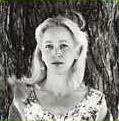Both Sides Now
Sarah Willis
 As a novelist, I write things that are true. At least they have to seem to be true. So I steal from my life; the things I've done, the places I've lived, the people I know. Sometimes I get a little too close to home; the father, Will Bartlett, in The Rehearsal is an actor and director, as my father was, but Will Bartlett is not my father. (Will is a very flawed character. I can't think of my father as flawed. He died when I was 12.) There is always a brother who gets beaten up by his sister, and often a beautiful blond mother. Also, I like to write about a place I have spent many of my summers, a place I love, Chautauqua, New York.
As a novelist, I write things that are true. At least they have to seem to be true. So I steal from my life; the things I've done, the places I've lived, the people I know. Sometimes I get a little too close to home; the father, Will Bartlett, in The Rehearsal is an actor and director, as my father was, but Will Bartlett is not my father. (Will is a very flawed character. I can't think of my father as flawed. He died when I was 12.) There is always a brother who gets beaten up by his sister, and often a beautiful blond mother. Also, I like to write about a place I have spent many of my summers, a place I love, Chautauqua, New York.
|
 |
But I can't write about myself. My stories are about someone else, which means I have to see these places, these people, these events in my life, through someone else's eyes, the eyes of my narrator. In Some Things That Stay, the hill in Chautauqua I watched sunsets from as a child has to be seen only through the eyes of Tamara, a girl whose father is a landscape painter, whose family has moved every spring...not through the eyes of a girl whose father was an actor, who goes back to that hill every summer. It's a small step in the imagination to see this hill differently -- Tamara is not so very different from me. But then I wanted to take a bigger step with the next book.
The Rehearsal still takes place in Chautauqua, but this time I needed to see the land through every character in the book, including an eight-year-old boy, a 26-six-year old ladies' man, a 60-year-old black man, and many more varieties of men and women. These are large steps to take, for a 40-something white woman, but it wasn't impossible. And that is not because I am a good writer, but because I am a good reader.
Since I was a child, I have read books. I have put myself into the places of other people. That's why I read. To discover what it would be like to be a teenage girl in Brooklyn at the turn of the century (A Tree Grows in Brooklyn by Betty Smith), or a migrant worker during the depression (The Grapes of Wrath by John Steinbeck), or even a fantastical character (who didn't want to be Bilbo Baggins in The Hobbit by J.R.R. Tolkien, or didn't feel deep sympathy for the Plain-Belly Sneetches?). Putting oneself into the shoes of others is exactly why they teach To Kill a Mockingbird by Harper Lee Ellison in high school. We need at times to step outside the narrow world we live in day to day, even if we love that world, and feel safe there.
 I live in Cleveland Heights, Ohio, and it is a wonderfully diverse city, but there are still limits to who I can meet here, even limits to who I can meet when I travel. I have found that world through reading, and because I have seen mankind through so many eyes, such varied eyes, I see both sides of issues, such as this war we are now in. I believe fully in the reality of different views, to the extent it is sometimes hard to find my own. It is no longer how I look at the view from a hill in Chautauqua, but what I believe about this war. My friends are pacifists and find this bombing a horrible thing, and as they speak, I nod and agree. My parents and brother believe we are doing the right thing, and as they list their reasons, I nod and agree. It is as if I am a character in one of my own books who I have not fully formed, that by writing and reading fiction I have lost the reality of myself and the real world.
I live in Cleveland Heights, Ohio, and it is a wonderfully diverse city, but there are still limits to who I can meet here, even limits to who I can meet when I travel. I have found that world through reading, and because I have seen mankind through so many eyes, such varied eyes, I see both sides of issues, such as this war we are now in. I believe fully in the reality of different views, to the extent it is sometimes hard to find my own. It is no longer how I look at the view from a hill in Chautauqua, but what I believe about this war. My friends are pacifists and find this bombing a horrible thing, and as they speak, I nod and agree. My parents and brother believe we are doing the right thing, and as they list their reasons, I nod and agree. It is as if I am a character in one of my own books who I have not fully formed, that by writing and reading fiction I have lost the reality of myself and the real world.
 But even as I write this, I disagree with myself, and know I do have an opinion: That I am afraid that maybe we are doing the wrong thing for the right reason, and that there is no truth here I will ever be able to understand. My opinion, and my emotions, waver. One minute I am proud, the next, ashamed. An honestly written character in a book is not always a constant. And neither are we. We are not perfect: we are flawed, as most likely my father was in ways I will never know. We make mistakes. We hem and haw. We argue ideals and morals. We hate and we love. We are hated, and we are loved.
But even as I write this, I disagree with myself, and know I do have an opinion: That I am afraid that maybe we are doing the wrong thing for the right reason, and that there is no truth here I will ever be able to understand. My opinion, and my emotions, waver. One minute I am proud, the next, ashamed. An honestly written character in a book is not always a constant. And neither are we. We are not perfect: we are flawed, as most likely my father was in ways I will never know. We make mistakes. We hem and haw. We argue ideals and morals. We hate and we love. We are hated, and we are loved.
 I want to write characters who are not me, but who are, really, partly me. I want diversity, and I want a feeling that we are all the same in some basic way. Sometimes this is hard to believe. But we have to see both sides, especially now. On the TV broadcast of a concert to raise money for New York City, Richard Gere was booed when he said this is a time for understanding. I was shocked they would boo him for saying this, and yet I completely understood. The concert was for the policemen and firemen and all those who helped save lives during the September 11 attack. But to boo understanding and peace and love -- how scary is that? And then, I go right back to understanding why they booed him. And then I want to cry.
I want to write characters who are not me, but who are, really, partly me. I want diversity, and I want a feeling that we are all the same in some basic way. Sometimes this is hard to believe. But we have to see both sides, especially now. On the TV broadcast of a concert to raise money for New York City, Richard Gere was booed when he said this is a time for understanding. I was shocked they would boo him for saying this, and yet I completely understood. The concert was for the policemen and firemen and all those who helped save lives during the September 11 attack. But to boo understanding and peace and love -- how scary is that? And then, I go right back to understanding why they booed him. And then I want to cry.
 I can see both sides and, in truth, I do not lose who I am by doing this. I believe this is a time to try to understand places and cultures completely different from our own. Stay who we are, keep going to our favorite hill and seeing the view as only we can, but then, try it through someone else's eyes, through the eyes of someone you might never meet on your street, in your town, in your church, or in you country. I do it for a living. We need to do it for living.
I can see both sides and, in truth, I do not lose who I am by doing this. I believe this is a time to try to understand places and cultures completely different from our own. Stay who we are, keep going to our favorite hill and seeing the view as only we can, but then, try it through someone else's eyes, through the eyes of someone you might never meet on your street, in your town, in your church, or in you country. I do it for a living. We need to do it for living.
Cleveland Arts Prize for Literature and Pushcart Prize nominee Sarah Willis' first novel Some Things That Stay won the Book of the Month Club's Stephen Crane Award for First Fiction. Her newest novel is The Rehearsal. She lives in Ohio with her two children.
Author photo by Sarah Willis.

